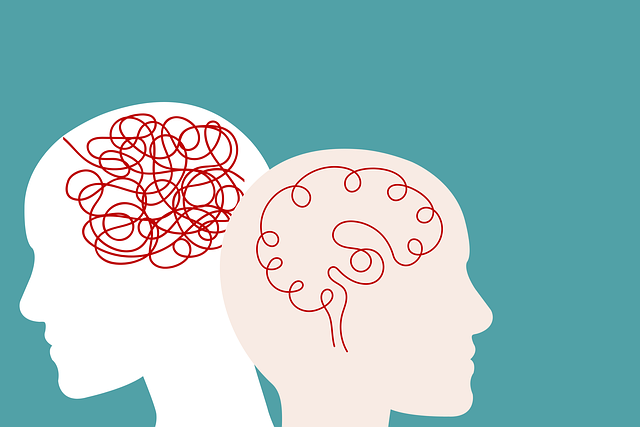Golden Adjustment Disorder Therapy (GADT) is an evidence-based approach for managing acute stress and burnout in high-pressure professions like healthcare, focusing on building emotional resilience. By combining cognitive behavioral therapy, mindfulness practices, and tailored stress management, GADT addresses underlying causes of stress and low self-esteem, improving emotional regulation and self-esteem. Effective crisis intervention identifies triggers such as stress, trauma, or substance abuse, using techniques like active listening and conflict resolution skills to foster resilience. Community outreach programs integrated with trauma support services create safe spaces, reducing the burden on emergency systems. Ongoing support after initial interventions, including CBT for mood management and specialized GADT sessions, is crucial for long-term mental health stability. Stigma reduction through education and policy advocacy enhances access to services, empowering individuals to adopt self-care practices and build support networks.
In times of crisis, effective intervention strategies are vital for managing intense emotions and preventing escalation. This article guides professionals through essential tools for navigating challenging situations, focusing on Golden Adjustment Disorder (GAD) Therapy as a foundational approach. We’ll explore how to identify crisis triggers, implement evidence-based techniques, provide post-intervention support, and establish long-term management strategies for optimal client outcomes. By understanding GAD Therapy principles, practitioners can offer compassionate care during crises.
- Understanding Golden Adjustment Disorder Therapy: A Brief Overview
- Identifying Crisis Situations and Common Triggers
- Implementing Evidence-Based Intervention Techniques
- Post-Intervention Support and Long-Term Management Strategies
Understanding Golden Adjustment Disorder Therapy: A Brief Overview

Golden Adjustment Disorder Therapy (GADT) is a specialized approach designed to help individuals cope with acute stress and prevent burnout, particularly in high-pressure professions like healthcare. It’s not merely about managing symptoms; GADT focuses on empowering people to adapt and adjust effectively to challenging situations, fostering resilience against the emotional toll of demanding careers.
This therapy integrates various techniques from cognitive behavioral therapy, mindfulness practices, and stress management strategies tailored to address burnout prevention for healthcare providers. By targeting underlying issues contributing to stress and low self-esteem, GADT facilitates improved emotional regulation—a crucial aspect for maintaining balance in the face of constant stressors. Self-esteem improvement is a key component, as it equips individuals with the confidence to navigate demanding environments while preserving their well-being.
Identifying Crisis Situations and Common Triggers

Identifying crisis situations is a critical first step in providing effective intervention. These moments often present as sudden and intense emotional or mental health challenges that significantly impair an individual’s ability to cope with daily life. Common triggers include severe stress, traumatic events, relationship breakdowns, financial difficulties, and substance abuse issues. Recognizing these indicators is crucial for timely intervention, especially when individuals exhibit signs of despair, aggression, or disassociation.
Golden Adjustment Disorder Therapy (GADT) offers valuable tools to navigate such crises by focusing on emotional well-being promotion techniques and empathy building strategies. GADT emphasizes the importance of active listening, validating individual experiences, and teaching effective conflict resolution techniques. These interventions help individuals develop resilience, manage intense emotions, and find constructive paths forward, ultimately supporting their recovery and long-term mental health.
Implementing Evidence-Based Intervention Techniques

Implementing evidence-based intervention techniques is a cornerstone of effective crisis support. When addressing acute situations, professionals must rely on strategies that have proven successful in numerous studies and real-world applications. For instance, techniques rooted in Golden Adjustment Disorder Therapy offer robust tools for managing and mitigating crises. This therapeutic approach emphasizes the cultivation of emotional intelligence, empowering individuals to recognize and regulate their emotions during stressful events.
Beyond individual therapy, community outreach program implementation plays a pivotal role. By integrating trauma support services into the fabric of communities, we create safe spaces where those in crisis can find solace and assistance. These initiatives foster collective resilience, ensuring that everyone has access to resources tailored to their unique needs, thereby enhancing overall well-being and reducing the burden on emergency response systems.
Post-Intervention Support and Long-Term Management Strategies

After an initial crisis intervention, providing ongoing support is vital for long-term management. This post-intervention phase plays a crucial role in preventing future crises and fostering recovery. Support strategies should be tailored to address the individual’s specific needs, focusing on mood management techniques, such as cognitive-behavioural therapy (CBT), which can help individuals cope with stress and regulate their emotions effectively. Golden Adjustment Disorder Therapy, for instance, offers valuable tools to navigate challenging situations and promote resilience.
Additionally, addressing mental illness stigma reduction efforts through education and awareness campaigns is essential. Mental health policy analysis and advocacy can drive systemic changes, ensuring better access to services and resources. By combining these approaches, individuals with mental health challenges can receive the necessary tools for self-care, build supportive networks, and develop coping mechanisms to manage their conditions in the long term.
Crisis intervention strategies, such as Golden Adjustment Disorder Therapy, play a vital role in managing intense situations. By understanding specific triggers, implementing evidence-based techniques, and providing post-intervention support, professionals can effectively navigate crisis scenarios. This holistic approach, including long-term management strategies, ensures individuals receive the necessary care to overcome challenges and foster resilience. Embracing these guidance principles equips helpers to make a significant impact in times of crisis.








